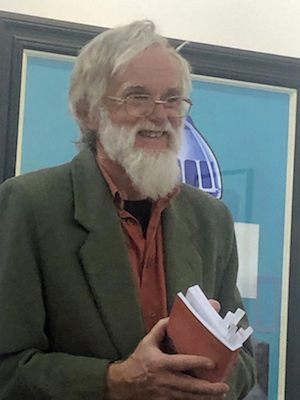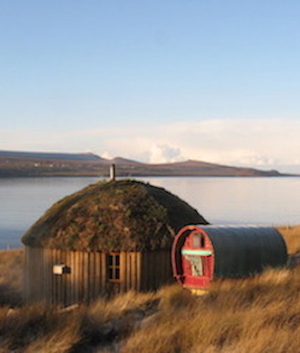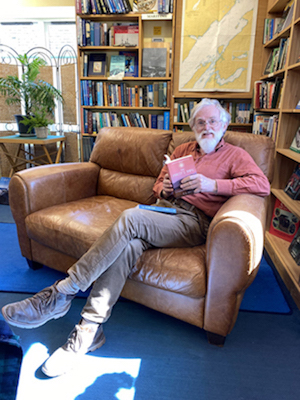About the author
I am a writer of fiction based in Ceredigion in Wales. I've been a writer all my life, from my English teacher at school giving me twelve out of ten for my essays, to editing my medical school's Gazette, to an unpublished collection of short stories, which I called “A Thin Place”.

the Moray Art Centre, Findhorn
Writing gives me freedom to explore social and environmental issues. Aside from technical papers, The Seaborne (2019) is my first published work, released by Wordcatcher, Cardiff. It is now in a new edition brought out by the Pantolwen Press, the publishing imprint of Bryn Glas Books. I was delighted and grateful when my second book, The Priest's Wife, was given a literary grant by the Books Council of Wales, who have continued to offer generous support in a variety of ways.
My books are set in an imaginary Celtic culture developed from what I learned during the time I lived in Scotland. Still, ‘lough’ is spelled the Irish way, and the little town where most of the action takes place is called Caerpadraig, which draws on both Welsh and Irish.
Living on the Scottish west coast
For years, when I owned a small croft on the Scottish west coast, looking out past Lewis into the North Atlantic, I heard some of the customs and stories of Gaelic culture through the living tradition of the Céilí Dé (the Culdees). When I first heard the story of the Island of Fincaighe (Fincara), I was impressed that its geographical location seemed pretty much where I imagined the Island of my Trilogy to be. That was before I started writing The Priest's Wife, but the thought stayed with me. When I needed to find a name for the nature spirit who hovers over the Island, it introduced itself again. The Isle Fincara gets a mention in Irish legend as an island below the sea. In the parallel world of my Trilogy it remains on the surface, more-or-less equidistant from Scotland and Ireland, and looking back to a pan-Celtic culture that reaches into antiquity.

on the Scoraig peninsular
Read my article in ‘The Scotsman’ 21st October 2023
A tragedy of the greatest possible magnitude
I find it a tragedy of the greatest possible magnitude that I see humanity heading towards a future of chaos and deprivation as the world heats up and we do far too little about it. It's my hope that my writing may do a little to re-connect us with the natural world of which we are a part, and in doing so point to our responsibility to preserve it, which is our own self-preservation.

Steading Bookshop, near Forres in Morayshire
In describing the Island world, I want to bring the feeling of the rocks, the streams, the woodland and the wildlife that inhabits it close to the reader's mind. I also want to imagine a society with a way of life that does no lasting harm. In this, I may be called a romantic, and I'm happy to admit to that. But I resist any suggestion that being romantic means being unrealistic. To the contrary, I think it is unrealistic to imagine that the highly industrialised way of life that humans have developed can continue unchecked.
The Isle Fincara Trilogy portrays a way of life that is much harder, on a physical level, than the city life John had known, but one that becomes more authentic and ultimately more satisfying for Dhion. It exacts its toll, but emphasises community. And it's sustainable; it knows nothing of the things that are degrading our modern lives and ecosystems.